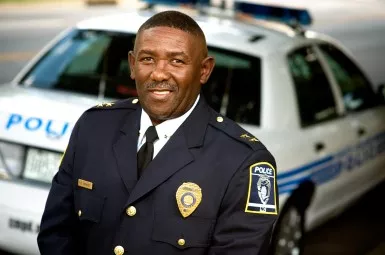Democratic National Convention 2012 Notebook: A command center takes shape
Early this week, the Charlotte City Council approved a request of close to $600,000 so the police department can renovate its downtown headquarters in preparation for the 2012 Democratic National Convention. On Thursday night, Rodney Monroe, Chief of the Charlotte-Mecklenburg Police Department, gave some details on the “command center” he said, that will be “the department’s management arm for the convention.”
Monroe has been “somewhat tight-lipped” about security, he said. But, though he said, “I wish it was Sept. 8, 2012 and it would be done,” Monroe added, “2012 is going to be an exciting year for us ... it’s going to unfold, you’re going to be in the moment, you’re going to respond to things.” The command center is set to be up by the end of the year or in early January.
Speaking to a meeting of the Charlotte Area Association of Black Journalists, Monroe said the goal was “not to prevent people from coming out and exercising their First Amendment rights” nor “to shut anything down” during the convention, a fear of some businesses and city residents who are still wondering how an influx of more than 35,000 delegates and visitors will affect their lives.
Some protesters are “looking to be disruptive,” he said. “Anarchists, they’re out there; they’re here in the city. We’re just trying to gather as much information as we can.” The CMPD is, he said, working with partners — local, regional and national — that represent the Secret Service, FBI and an alphabet soup of agencies and departments. They are meeting every three to four weeks, he said. “You name it, we have a committee for it.”
Charlotte has sent police officers to help other jurisdictions for events such as the inauguration and economic summits, and departments in other cities will reciprocate, sending officers for the convention. Charlotte and Tampa, Fla., site of the Republican convention, are expecting about $50 million each from Congress for security, the policy since 9/11.
Monroe said he knows the challenges and expectations. Political conventions “determine the leaders of our country.” And Charlotte will be hosting a sitting president, one who “has probably received more threats than any president in history.”
In more than two decades of police work in Washington, D.C., Monroe oversaw arrangements for large gatherings such as the Million Man March. “Events similar to this were common occurrences in Washington, and that gave us a leg up.” As he prepares for DNC 2012, he is investigating technology and social media tools, and said he has studied “flash mobs” in cities such as Philadelphia and Chicago. “Law enforcement will have a legacy,” he said. “We want people talking about the way we were able to conduct the convention,” safely and with “as little disruption as possible.”
He said he doesn’t want residents to think the convention will be the only thing on the department’s radar during that week in September 2012. “We also have the responsibility of the rest of the city,” he said, and amid the crowds and the international attention a political convention will bring, that’s one thing he said he wants the people of Charlotte to remember.
Mary C. Curtis, an award-winning Charlotte, N.C.-based journalist, is a contributor to The Root, NPR, Creative Loafing and the Nieman Watchdog blog. Her “Keeping It Positive” segment airs Wednesdays at 7:10 on TV’s Fox News Rising Charlotte, and she was national correspondent for Politics Daily. Follow her on Twitter: http://twitter.com/mcurtisnc3.


